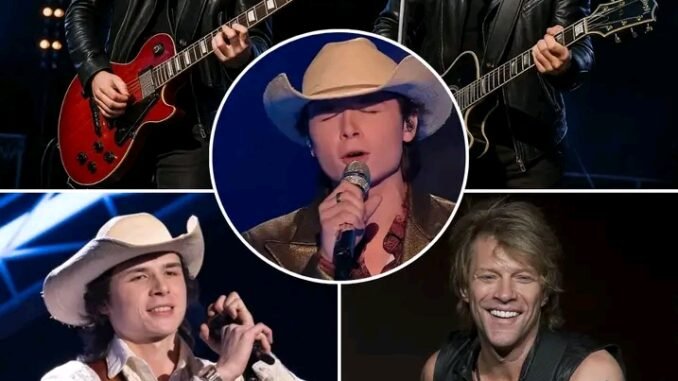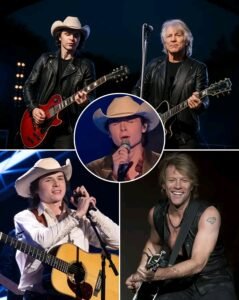
When Cowboys Venture Into the Rock Industry: John Foster’s Defining Moment with Bon Jovi
It was a night no one would forget—a collision of genres, generations, and genuine musical power. When Jon Bon Jovi invited rising country star John Foster to share the stage for a surprise duet of “Wanted Dead or Alive,” no one could have predicted the seismic shift it would cause in the music world. In a stadium packed with thousands of fans and humming with anticipation, one performance became a milestone in both artists’ careers—and a declaration that the future of music lies in bold fusions, not boundaries.
The stage was set for Bon Jovi’s world tour stop at a sold-out stadium in Dallas, Texas—a city where rock and country often cross paths but rarely embrace. The crowd, buzzing from earlier performances, expected the familiar: a night of powerful ballads, anthemic choruses, and nostalgic hits. But as the lights dropped and the slow, iconic strums of “Wanted Dead or Alive” echoed into the dark, something different hung in the air.
Jon Bon Jovi stepped into the spotlight as expected, every inch the seasoned rock icon. With silver in his hair and steel in his voice, he began to deliver the first verse with the same weary defiance that had defined the song for decades. Then, without warning, another figure emerged through the smoke—a young man in a dusty cowboy hat, boots, and denim, his presence quiet but magnetic.
It was John Foster.
At first, the crowd was stunned. Then, as realization swept through the stadium, a roar erupted that shook the rafters. Foster didn’t just join the performance—he seized it. He wasn’t imitating Bon Jovi or trying to outshine him. He was living the song in real time. His voice—a blend of gravel, soul, and fire—poured into the microphone with the fury and feeling of a man who had been on the road, who had lived the lyrics. When he sang “I’m a cowboy, on a steel horse I ride…” it didn’t sound like a lyric. It sounded like a testimony.
The blend of Foster’s rugged country roots and Bon Jovi’s polished rock power created a hybrid performance that was more than music—it was a storm. A swirling, emotional tornado of twanging guitars and soaring vocals that swept through the arena and left no soul untouched. The cowboy didn’t just sing—he roared, like a musical warrior fresh from battle, his eyes blazing with passion and his voice slicing through the air like lightning.
What made the moment even more remarkable was Bon Jovi himself. Rather than taking center stage as the legend he is, he stepped aside—both literally and figuratively—to allow Foster to rise. He offered nods, smiles, and harmonies, lifting Foster with every chord. He didn’t lead with ego; he led with generosity. And in doing so, he gave birth to a star.
Foster’s verse turned into a chorus. That chorus turned into a roar. And by the time they hit the final bridge, the stadium was no longer watching a performance—it was witnessing a coronation.
Fans recorded every second. Clips flooded social media within minutes. The phrase “John Foster Bon Jovi Duet” trended worldwide. It wasn’t just a viral moment. It was a cultural moment. One that critics would later describe as “the most powerful live crossover performance in a decade.”
But the performance wasn’t just fireworks and fandom. It was deeply symbolic. “Wanted Dead or Alive” is a song about the lonely, wandering soul of an artist—the hard road, the glory, the price. And here it was, sung by a man who had already lived that narrative in honky-tonks and dusty fairgrounds. John Foster wasn’t pretending. He was that cowboy. And Bon Jovi, decades removed from his own early struggles, saw it.
In interviews afterward, Foster was humble. “That night wasn’t just a big break,” he said. “It was a dream I didn’t even think I was allowed to dream. Standing next to Jon—man, he didn’t treat me like a kid. He treated me like an equal. Like someone who belonged.”
Bon Jovi, too, offered high praise. “John’s got that spark,” he told reporters. “You don’t hear it often, but when you do, you know it. That night, it wasn’t about me. It was about the song, and about passing it on to someone who can carry it forward with honor.”
Indeed, Foster’s career changed overnight. His streaming numbers tripled. His debut album, Backroads and Battle Scars, returned to the charts. But perhaps most importantly, the performance earned him respect—not just from fans, but from artists across both the country and rock industries.
Music insiders began calling him “the bridge”—a rare artist who could unite two often separated worlds. And the buzz wasn’t just talk. In the months that followed, Foster was invited to perform at both Stagecoach and Lollapalooza. He became a symbol of something bigger: a reminder that authenticity doesn’t belong to a genre—it belongs to the soul.
That night with Bon Jovi didn’t just make John Foster a household name. It made him a force. One song, one spotlight, one defining moment launched him from rising star to legend-in-the-making.
When cowboys venture into the rock industry, they don’t always survive the storm.
When Cowboys Venture Into the Rock Industry: John Foster’s Defining Moment with Bon Jovi
It was a night no one would forget—a collision of genres, generations, and genuine musical power. When Jon Bon Jovi invited rising country star John Foster to share the stage for a surprise duet of “Wanted Dead or Alive,” no one could have predicted the seismic shift it would cause in the music world.

In a stadium packed with thousands of fans and humming with anticipation, one performance became a milestone in both artists’ careers—and a declaration that the future of music lies in bold fusions, not boundaries.
The stage was set for Bon Jovi’s world tour stop at a sold-out stadium in Dallas, Texas—a city where rock and country often cross paths but rarely embrace. The crowd, buzzing from earlier performances, expected the familiar: a night of powerful ballads, anthemic choruses, and nostalgic hits. But as the lights dropped and the slow, iconic strums of “Wanted Dead or Alive” echoed into the dark, something different hung in the air.
Jon Bon Jovi stepped into the spotlight as expected, every inch the seasoned rock icon. With silver in his hair and steel in his voice, he began to deliver the first verse with the same weary defiance that had defined the song for decades. Then, without warning, another figure emerged through the smoke—a young man in a dusty cowboy hat, boots, and denim, his presence quiet but magnetic.
It was John Foster.
At first, the crowd was stunned. Then, as realization swept through the stadium, a roar erupted that shook the rafters. Foster didn’t just join the performance—he seized it. He wasn’t imitating Bon Jovi or trying to outshine him. He was living the song in real time. His voice—a blend of gravel, soul, and fire—poured into the microphone with the fury and feeling of a man who had been on the road, who had lived the lyrics. When he sang “I’m a cowboy, on a steel horse I ride…” it didn’t sound like a lyric. It sounded like a testimony.
The blend of Foster’s rugged country roots and Bon Jovi’s polished rock power created a hybrid performance that was more than music—it was a storm. A swirling, emotional tornado of twanging guitars and soaring vocals that swept through the arena and left no soul untouched. The cowboy didn’t just sing—he roared, like a musical warrior fresh from battle, his eyes blazing with passion and his voice slicing through the air like lightning.
What made the moment even more remarkable was Bon Jovi himself. Rather than taking center stage as the legend he is, he stepped aside—both literally and figuratively—to allow Foster to rise. He offered nods, smiles, and harmonies, lifting Foster with every chord. He didn’t lead with ego; he led with generosity. And in doing so, he gave birth to a star.
Foster’s verse turned into a chorus. That chorus turned into a roar. And by the time they hit the final bridge, the stadium was no longer watching a performance—it was witnessing a coronation.
Fans recorded every second. Clips flooded social media within minutes. The phrase “John Foster Bon Jovi Duet” trended worldwide. It wasn’t just a viral moment. It was a cultural moment. One that critics would later describe as “the most powerful live crossover performance in a decade.”
But the performance wasn’t just fireworks and fandom. It was deeply symbolic. “Wanted Dead or Alive” is a song about the lonely, wandering soul of an artist—the hard road, the glory, the price. And here it was, sung by a man who had already lived that narrative in honky-tonks and dusty fairgrounds. John Foster wasn’t pretending. He was that cowboy. And Bon Jovi, decades removed from his own early struggles, saw it.
In interviews afterward, Foster was humble. “That night wasn’t just a big break,” he said. “It was a dream I didn’t even think I was allowed to dream. Standing next to Jon—man, he didn’t treat me like a kid. He treated me like an equal. Like someone who belonged.”
Bon Jovi, too, offered high praise. “John’s got that spark,” he told reporters. “You don’t hear it often, but when you do, you know it. That night, it wasn’t about me. It was about the song, and about passing it on to someone who can carry it forward with honor.”
Indeed, Foster’s career changed overnight. His streaming numbers tripled. His debut album, Backroads and Battle Scars, returned to the charts. But perhaps most importantly, the performance earned him respect—not just from fans, but from artists across both the country and rock industries.
Music insiders began calling him “the bridge”—a rare artist who could unite two often separated worlds. And the buzz wasn’t just talk. In the months that followed, Foster was invited to perform at both Stagecoach and Lollapalooza. He became a symbol of something bigger: a reminder that authenticity doesn’t belong to a genre—it belongs to the soul.
That night with Bon Jovi didn’t just make John Foster a household name. It made him a force. One song, one spotlight, one defining moment launched him from rising star to legend-in-the-making.
When cowboys venture into the rock industry, they don’t always survive the storm.
But John Foster didn’t just survive.
He was the storm.
Leave a Reply